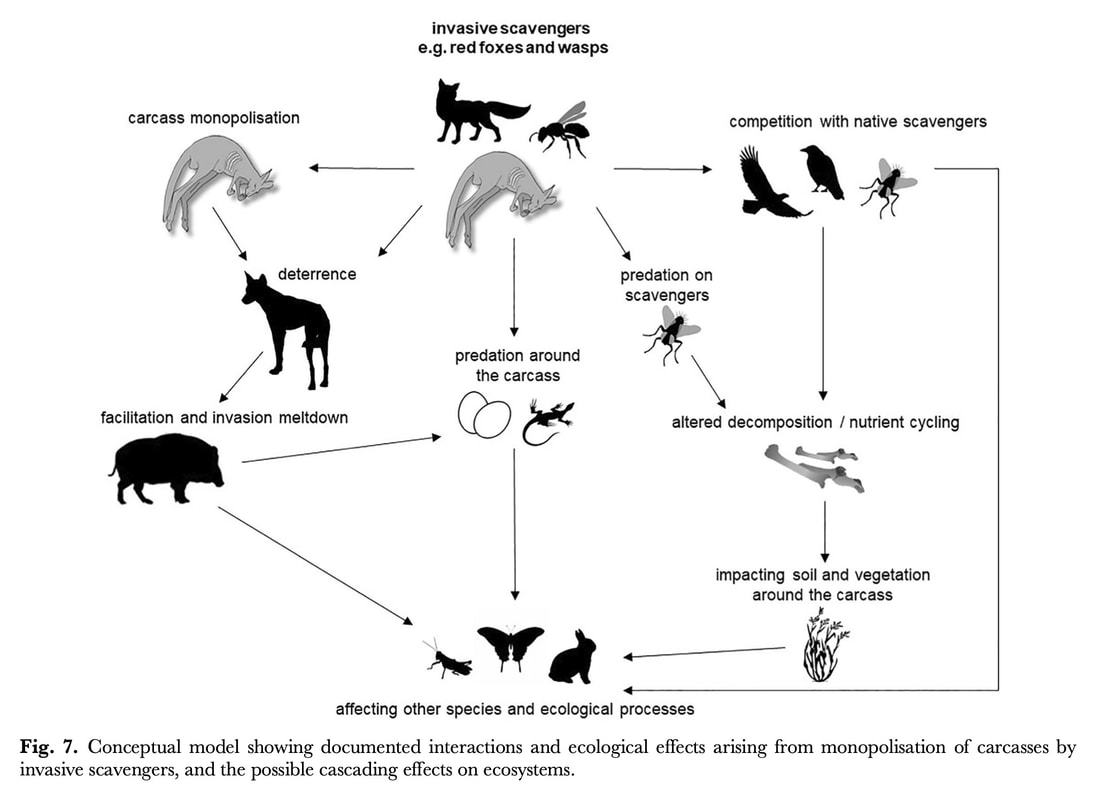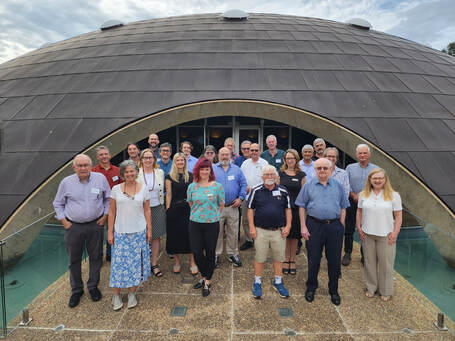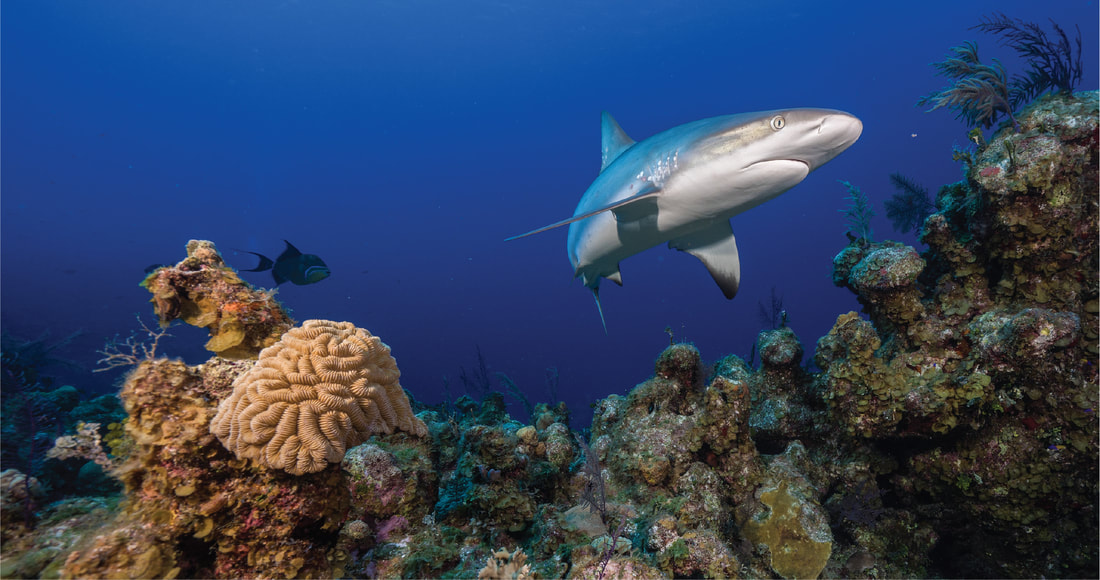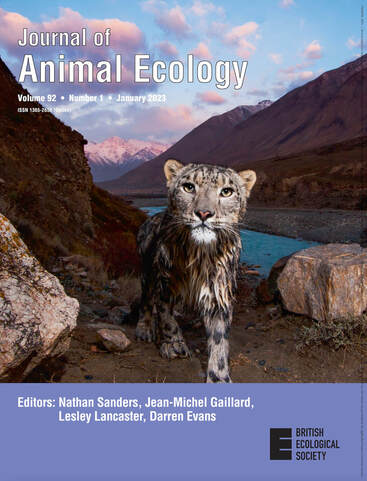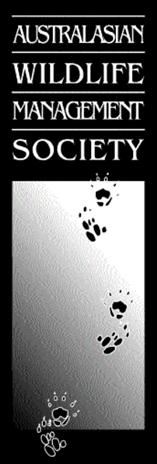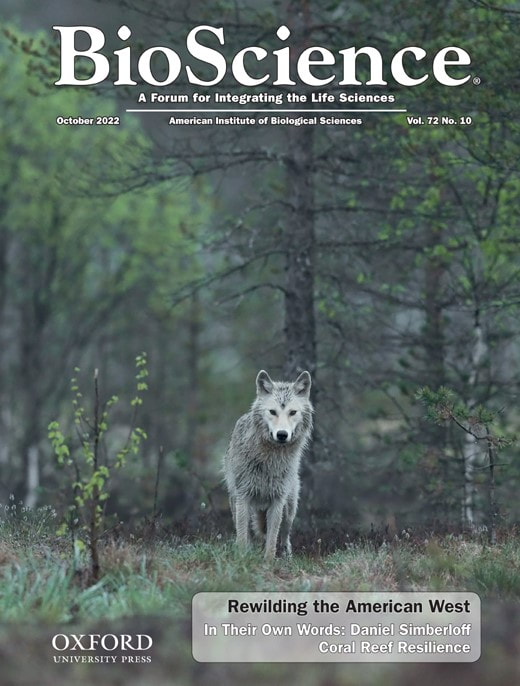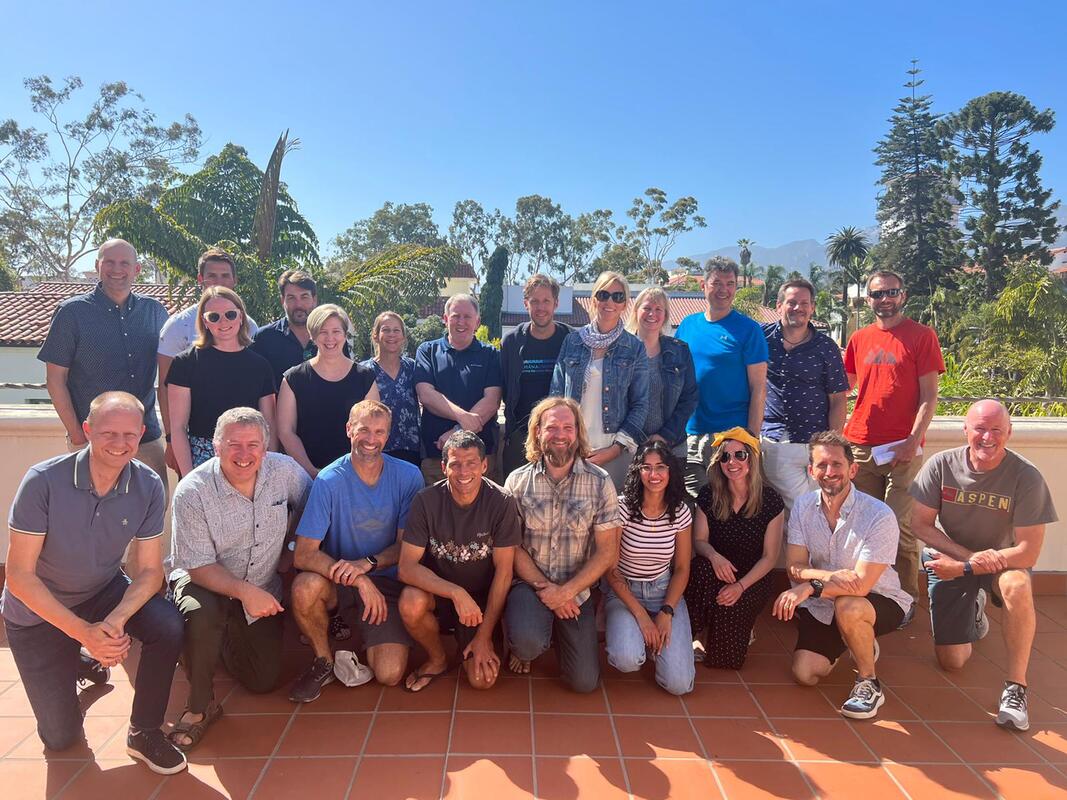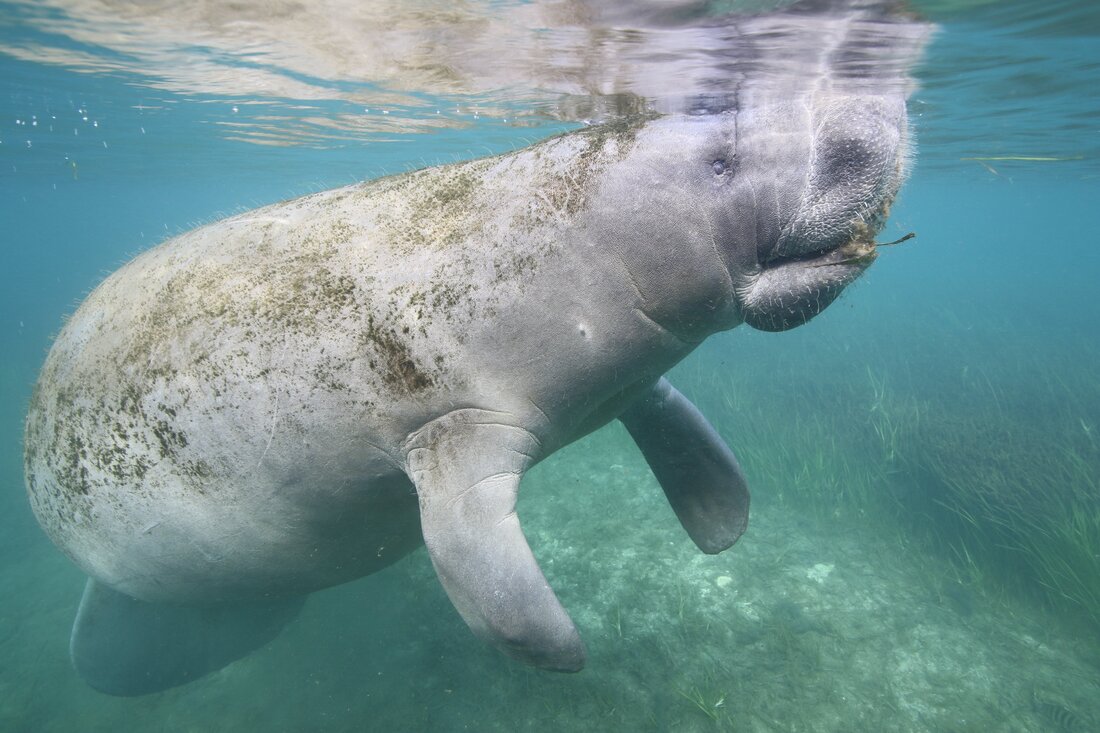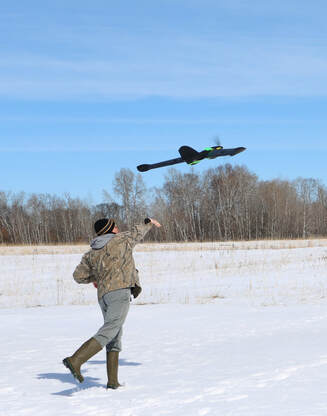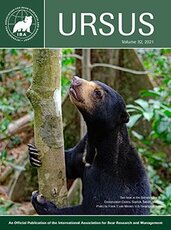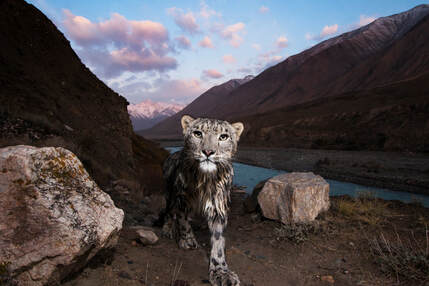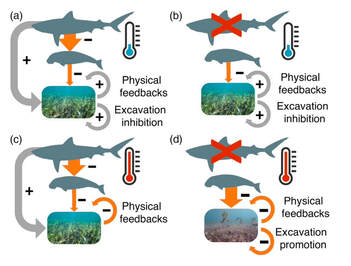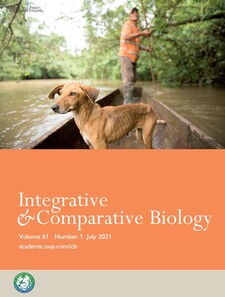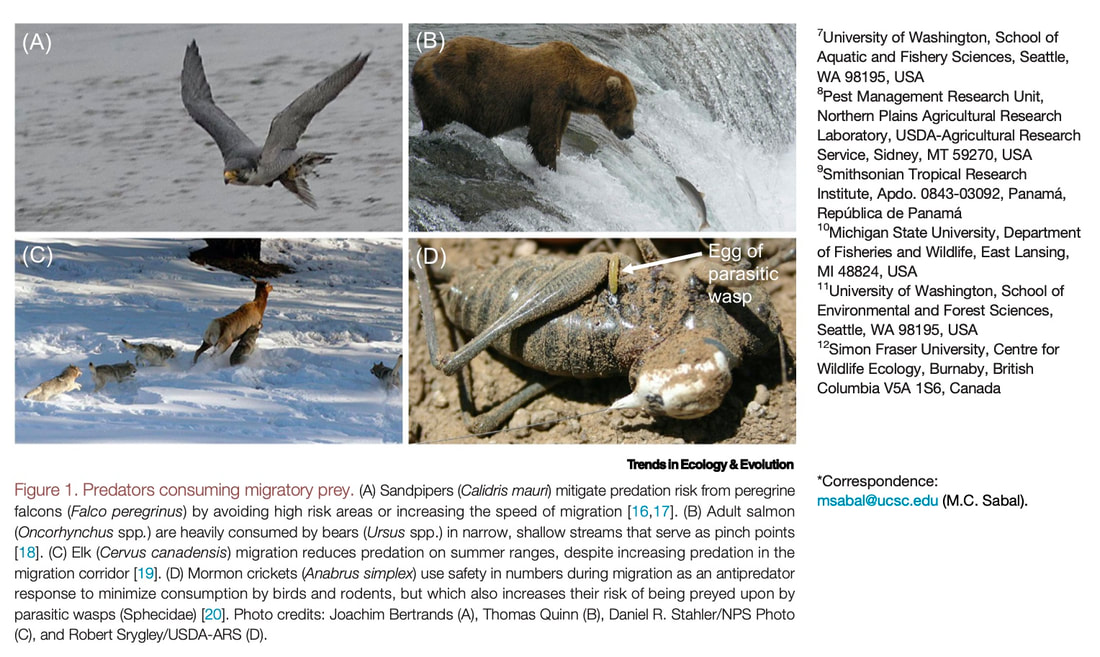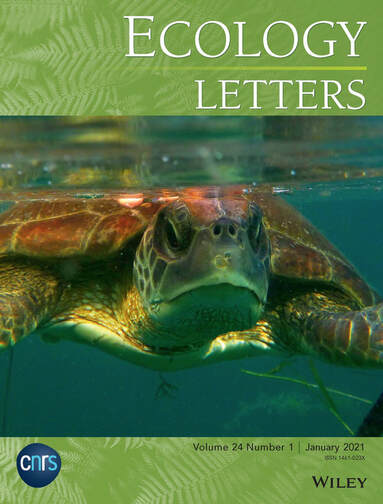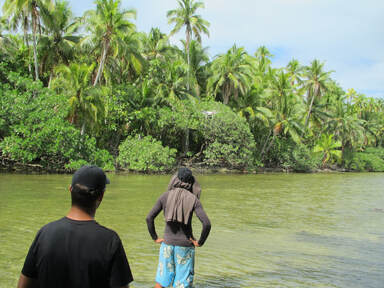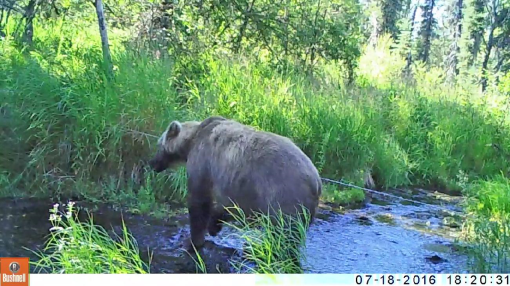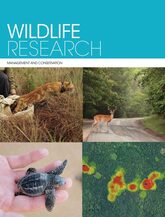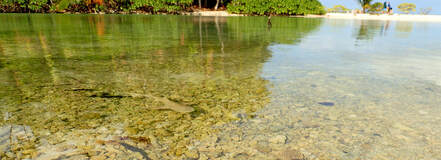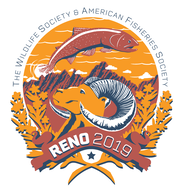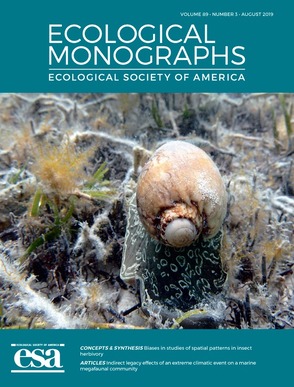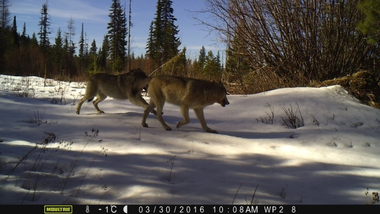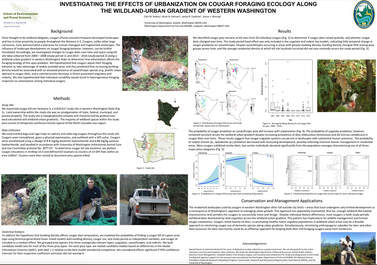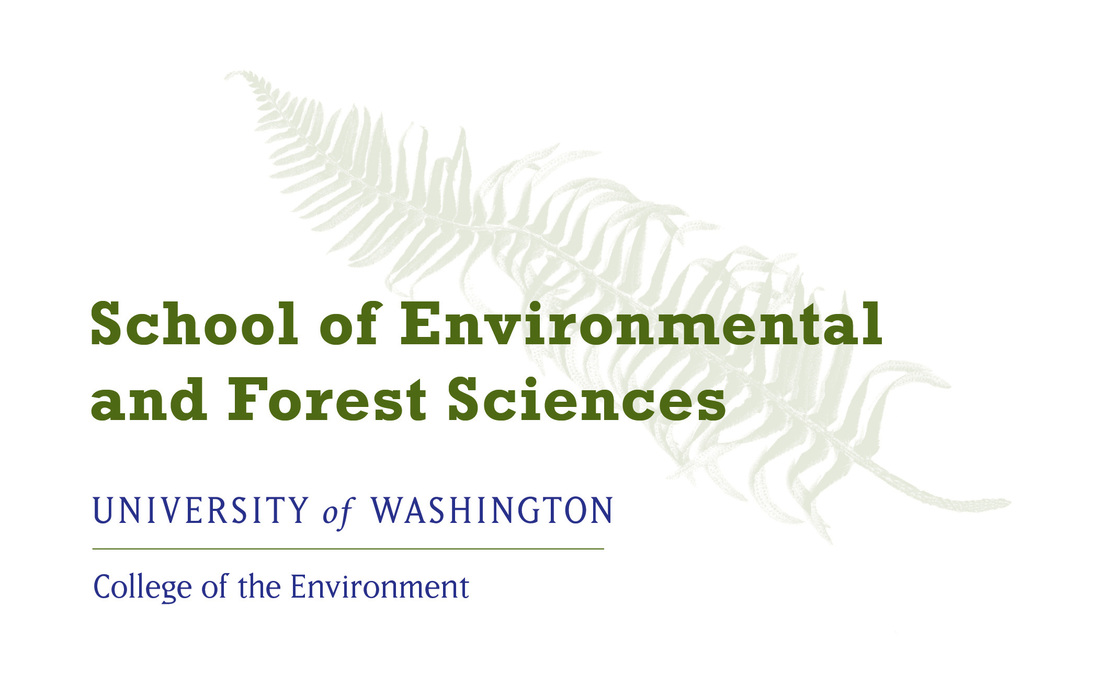Welcome to the Predator Ecology Lab!
Since 2008, as part of the Wildlife Science Program in the University of Washington's School of Environmental and Forest Sciences, we have sought a better understanding of how predators influence their surroundings by interacting with one another and their prey. Much of our work also seeks solutions to the challenges of large carnivore conservation and management in a changing world.
The PEL is committed to promoting diversity, equity, inclusion, and accessibility. To that end, we seek new members and partnerships that broaden representation in our field and strive to maintain a balanced, respectful, and supportive work environment.
Want to support the work being done in the PEL? Please follow this link to make a tax-deductible donation through UW Giving - thanks!
Since 2008, as part of the Wildlife Science Program in the University of Washington's School of Environmental and Forest Sciences, we have sought a better understanding of how predators influence their surroundings by interacting with one another and their prey. Much of our work also seeks solutions to the challenges of large carnivore conservation and management in a changing world.
The PEL is committed to promoting diversity, equity, inclusion, and accessibility. To that end, we seek new members and partnerships that broaden representation in our field and strive to maintain a balanced, respectful, and supportive work environment.
Want to support the work being done in the PEL? Please follow this link to make a tax-deductible donation through UW Giving - thanks!
Latest News
|
June 20, 2024: We're happy to report that, today, our paper based on fieldwork led by former PEL postdoc Dr. Jimmy Kilfoil and including analyses led by former UW undergraduate Gaby Krohn as part of a senior thesis (Capstone) project, titled "Divergent learning responses to a spatially consistent olfactory stimulus in two reef shark species" is officially published in Marine Ecology Progress Series! The paper, which suggests that some reef shark species - namely blacktip reef sharks - may sensitize to olfactory-only stimuli (in the form of baited remote underwater video systems, or BRUVs) that are offered repeatedly in he same location even without associative reinforcement, is the result of a real team effort also involving our long-term partners at the Centre de Recherches Insulaires et Observatoire de l’Environnement (CRIOBE) and Florida International University. It also could not have been completed without the logistical support and partnership of the Tetiaroa Society.
In related news, if you are interested in learning more about our ongoing work on reef sharks in Tetiaroa, French Polynesia, please see this wonderful new story produced recently by the UW College of the Environment. Photo to the right by Mark Stone. |
|
June 7, 2024: Today, we celebrate Laurel Peelle's graduation. Laurel defended her doctoral research on April 22 and handed in her dissertation titled "Predator-prey dynamics in southern boreal forests of Washington state" before walking the stage during the SEFS graduation ceremony this afternoon. Congratulations, Laurel - you've earned this honor and we will miss your good humor, team spirit, and lynx stories! Note, the picture to the right was taken when Laurel and I were scouting for snowshoe hare study sites up on the Loomis State Forest of Washington's east side right at the outset of her first field season; if you squint, you can see the hare sitting atop the rock, in its gray-brown summer coat (photo by AW).
|
|
May 23, 2024: Hearty congratulations to PEL postdoc Dr. Frances Farabaugh, whose dissertation research appears in a Marine Ecology Progress Series paper, published today! Using baited remote underwater video systems (BRUVS, see a video to the right and the photo below) and working as part of the Global FinPrint Project, Dr. Farabaugh found that atolls support three times more reef shark abundance than do higher islands. Explaining this geomorphological effect will be a focus of her post-doctoral research here at the University of Washington. Photo and video credits: F. Farabaugh.
|
|
|
May 20, 2024: New paper from the FinPrint project out today in Nature Ecology and Evolution, led by Jordan Goetze and showing that the conservation benefits of marine protected areas for reef sharks are roughly doubled when they are imbedded in larger areas featuring effective fisheries management (see the infographic to the right). A key insight, then, is that the biosphere approach of surrounding protected areas with buffer zones also applies to marine settings, at least when it comes to wide-ranging taxa like sharks. Please see also the associated New & Views article written by David Jacoby here.
|
|
March 5, 2024: Today, a delightful sabbatical project came to fruition with the publication of an article in Biological Reviews titled, "Scavenging with invasive species". I am supremely grateful to PEL alum and longtime collaborator Professor Tom Newsome for bringing me aboard this effort, which notably is available via open access, while I (AW) spent time in 2022 as visiting faculty at the University of Sydney, and so enjoyed working with the whole authorship team (not least because I got to do so from my "office" at Bondi Beach)!
|
|
December 10, 2023: Last week, I (AW) visited Canberra, Australia for the annual meeting of the Commonwealth Scientific and Industrial Research Organisation (CSIRO) Board of Standards meeting in my capacity as one of the Editors-in-Chief for the journal Wildlife Research. The sunshine in the Australian Capital Territory was a welcome respite from the rainy weather we've been getting in Seattle, and in addition to seeing some old friends and meeting some new ones, I was able to get in a few runs around Lake Burley Griffin. Can't wait to make the trip again next year!
The photo to the right features all of the attendees, with the Shine Dome of the Australia Academy of Science in the background. |
August 14, 2023: We are thrilled for Apryle Craig, who will be wrapping up her dissertation while working as a Biometrician at Cramer Fish Sciences, a consulting firm working along the west coast to solve challenges with fish populations and riparian and aquatic ecology. Congratulations, Apryle, and so well deserved!
|
Jun 16, 2023: New paper out in Science today from the Global FinPrint Project, of which our Tetiaroa reef shark study is a small part. Led by Colin Simpfendorfer, adjunct professor of Marine and Aquaculture Science at James Cook University in Australia, the paper shows that, primarily owing to overfishing, the five main coral reef shark species — grey reef, blacktip reef, whitetip reef, nurse and Caribbean reef sharks — have decline globally by 63% but are still common in areas with protection and effective governance, pointing to pathways for recovery. The paper is also covered by an Insights article by David Shiffman. The photograph to the right was taken by Andy Mann.
|
June 1, 2023: Today, the UW College of the Environment's FieldSound Podcast features an episode showcasing PEL research. Thank you to Sarah Smith for an engaging interview!
May 18, 2023: Today, the PEL is pleased to be part of a new Science publication titled, "Fear of large carnivores amplifies human-caused mortality for mesopredators", with SEFS colleague and Washington Predator-Prey Project (WPPP) co-PI Laura Prugh as the lead author! The paper has received its of media attention, and is also covered by Darimont and Shukla in a companion Perspective, as well as in the Conversation.
March 10, 2023: Today, Clint Robins successfully defended his dissertation titled, "Large carnivore behavior and intraguild interactions under anthropogenic influence", and he did so with aplomb, kicking things off with a funny anecdote that not only set up the theme of his research but also had the room in stitches and then delivering a seamless talk. We're sad to have to bid Clint adieu but also excited to see what he'll do next. Congratulations from all of us, Clint!
|
January 4, 2023: New paper out in the Journal of Animal Ecology titled, "Ungulate spatiotemporal responses to contrasting predation risk from wolves and snow leopards", led by PEL alum Dr. Shannon Kachel (now with Panthera). And, we got the cover (photo by Sebastian Kennerknecht)! Congratulations and superb work, Shannon!
|
January 1, 2023: It is with bittersweet feelings that we bid farewell to Dr. James (Jimmy) Kilfoil, who has taken a permanent position at the South Carolina Department of Natural Resources (SCDNR) as an Assistant Marine Scientist. Over the past three years, Jimmy has been the point person for our ongoing reef shark project in Tetiaroa (which also formed much of the basis for his PhD work starting in 2015), and he has also been involved in the Aleknagik Bear Project, particularly as leader of an effort to explore human impacts of brown bear diet behavior. In his current role, Jimmy works with the SCDNR Inshore Fisheries Research Section in support of estuarine finfish and coastal shark research, with the goal to better understand coastal fish populations and provide information useful for their sustainable management, while also serving as an Adjunct Faculty member at the College of Charleston. Best of luck with all of your career endeavors, Jimmy, and thank you for being such a collegial and collaborative member of the PEL!
|
December 8, 2022: As part of my sabbatical trip to Australia, I (PI) enjoyed giving a talk at the 2022 Australasian Wildlife Management Society (AWMS) meeting in Napier, NZ titled, "Cougars (Puma concolor) prioritize temporal avoidance of wolves (Canis lupus) over humans". Thank you to PEL alum Dr. Tom Newsome for the invitation - what a fun conference!
|
|
October 4, 2022: New paper just out in the journal Bioscience extolling the idea of rewilding the American West by restoring populations of gray wolves and beavers, with longtime colleague Bill Ripple (Oregon State University) at the helm. Thanks, Bill, for including us! Also, we got the cover!
|
|
June 17, 2022: Just wrapped up a workshop on the Ecological Importance of Sharks, led by longtime collaborator Mike Heithaus (Florida International University) and hosted by the National Center for Ecological Analysis and Synthesis (NCEAS) at the University of California, Santa Barbara. The scenery and weather were sublime; the company and exchange of ideas even better. Looking forward to working with this group for some time to come, and so many thanks to NCEAS for being such generous and accommodating hosts!
|
May 27, 2022: Congratulations today go to Michael Havrda, who successfully defended his MS Thesis titled, "Carnivore responses to urbanization and human presence along an urban-wildland gradient in western Washington"! Michael deserves heaps of credit for an excellent presentation and discussion afterwards, and special thanks also to Robert Long, of the Woodland Park Zoo, for being such a great partner on this project!
May 16, 2022: Congratulations are in order for PEL alum Dr. Shannon Kachel, whose Dissertation chapter titled, "Predicting carnivore habitat use and livestock depredation risk with false-positive multi-state occupancy models" was just published in the journal Biological Conservation. Excellent work, Shannon!
|
May 12, 2022: Our new mega-review of sirenian ecological roles and importance is out today in Marine Ecology Progress Series, as an Open Access article! Several years in the making and a passion project in many respects, this effort wouldn't have happened without the support of a great team including Jeremy Kiszka, Aarin-Conrad Allen, and Mike Heithaus (all of Florida International University). Thanks, team, and to Lindsay Marshall (www.stickfigurefish.com.au) for the beautiful artwork! Photo of a Florida manatee courtesy of J. Kiszka.
|
|
February 8, 2022: Today, we are delighted to announce the publication of a special issue of the journal Wildlife Research, for which AW serves as Editor-in-Chief, titled, "The rapidly expanding role of drones as a tool for wildlife research". This special issue features studies pushing the taxonomic and innovation boundaries of drone research and, as a result, helps to address remaining knowledge and application gaps associated with these unpiloted aircraft systems while also showcasing how drone research is likely to continue pushing biology and conservation in exciting new directions. We are grateful to CSIRO Publishing and the journal for supporting this effort, all of the authors who contributed to this special issue, and guest editors Dr. Aaron Johnston (a SEFS alum!) and Dr. Jeremy Kiszka (a partner on our Tetiaroa reef shark project), with whom AW joined to write the Foreword! Photo credit: Michael McMahon (launching a fixed-wing drone equipped with a thermal infrared sensor to estimate white-tailed deer, Odocoileus virginianus, population density).
|
|
January 26, 2022: It is often tremendous fun to spend time deep down in the reeds exploring the finer details of ecological theory and practice, and that is exactly what led to today's publication, a short communication titled "Optimal barbed wire height for brown bear hair sample collection" in the journal Ursus. The paper, led by Thomas Quinn and also featuring Michael Proctor, chronicles how the standard practice of positioning strands of barbed wire 50 cm above the ground to share hair from passing bears came about (thanks to Michael) while pairing this story with a test of how well this height threshold works (NB: very well!). Stay tuned for more to come from the Alaska Salmon Program's bear project!
|
January 1, 2022: It gives me great pleasure to announce our new publication in Oikos titled, "Predators reduce niche overlap between sympatric prey"! This paper is the third and final chapter from Dr. Justin Dellinger's dissertation, and Justin deserves many plaudits for pulling this massive effort together. It is also a heartening demonstration of the kind of teamwork for which we strive in the Predator Ecology Lab, with April Craig contributing animal-borne video data revealing mule and white-tailed deer diets in areas with and without wolves, Dr. Shannon Kachel performing the multivariate modeling of the deer diet data, and Dr. Carolyn Shores chipping in with field work, conceptualization, and writing. Many thanks to all of the authors and collaborators who helped to make this paper happen!
|
October 27, 2021: Hearty congratulations to Shannon Kachel, who today successfully defended his PhD dissertation titled, "Large carnivore ecology and conservation in the high mountains of Central Asia"! Many thanks to the members of the audience who turned out in impressive numbers, to Panthera for their support of Shannon's work, and to Dr. Kachel for a job well done! The amazing photo to the right, taken at Shannon's field site in Kyrgyzstan, is by Sebastian Kennerknecht.
|
October 10, 2021: Two recent publications, both open access, bear mentioning today. First, former UW Quantitative Ecology and Resource Management (QERM) PhD student Dr. Chloe Bracis and I (AW) recently published a paper in Frontiers in Ecology and Evolution exploring the role that resource memory might play in shaping prey responses to introduced predators. Second, the last of a series of papers from the WA Wolf Economy Project, led by Dr. Carol Bogezi, just appeared in the latest issue of Frontiers in Conservation Science. Kudos to Chloe, Carol, and all of the team members on these papers!
|
September 15, 2021: We are excited to announce the publication of a paper titled, "Loss of predation risk from apex predators can exacerbate marine tropicalization caused by extreme climatic events" in the latest issue of the Journal of Animal Ecology. Part of a special feature titled, "Reconciling Resilience Across Ecological Systems, Species and Subdisciplines" and led by Dr. Rob Nowicki, the paper is based on a simulated grazing experiment showing how risk from Shark Bay's top predator, the tiger shark, is likely buffering recovering temperate seagrasses from being eliminated by foraging dugongs in the wake of a marine heat wave.
|
August 1, 2021: Thanks to PEL alum Dr. Lily van Eeden for leading another sterling effort under the Wolf Economy Project umbrella, this one titled "Public willingness to pay for gray wolf conservation that could support a rancher-led wolf-livestock coexistence program", which appears in the new August issue of Biological Conservation!
|
July 23, 2021: Following on from our earlier post about participating in the Society of Integrative and Comparative Biology's annual meeting special session titled, "S11: Biology's best friend: bridging disciplinary gaps to advance canine science" back in January, the ICB journal issue containing the full slate of session papers, including two of which we are a part, has been published. Thank you again to my co-author Thomas Newsome, and to Ana Jimenez and Caleb Bryce and all of the session participants for being so fun to work with!
|
|
July 14, 2021: We are so happy to announce the publication of an exciting new paper titled, "Predation landscapes influence migratory prey ecology and evolution", just out today in Trends in Ecology and Evolution! Emerging from discussions at the 2019 American Fisheries Society/Wildlife Society Joint Meeting, the review offers a new framework for understanding (and exploring) the relationship between predation, including that imposed by humans, and the behavior, fitness, and conservation of migrating animals. Thank you to all of our co-authors, who were such a delightful team with which to work, and especially to Megan Sabal for her fearless leadership!
|
January 14, 2021: There are few things more rewarding for a PI, in my view at least, than seeing undergraduate research they help supervise end up as a publication. So, it is with tremendous pride that I congratulate Hyejoo Ro, of the School of Aquatic and Fishery Sciences (SAFS), on her recent first-authored publication in the Journal of Fish and Wildlife Management, profiled nicely today in this story. A product of Hyejoo's involvement in the Alaska Salmon Program and relying on stable isotopic analysis, Hyejoo's paper (co-authored with me (AW), SAFS professor Tom Quinn, and SAFS graduate student Jenny Stern) reveals considerable diversity in the reliance on salmon by brown bears with ready access to salmon spawning streams, underscoring the complexity and flexibility of bear foraging behavior. Here's to a rising star!
January 7, 2021: (AW) had an absolute blast participating in the symposium titled "Biology's Best Friend: Bridging Disciplinary Gaps to Advance Canine Science", which was part of the Society for Integrative and Comparative Biology (SICB) annual meeting. Our talk was titled, "Scavenging effects if large canids". Thank you so much to my co-presenter/author Thomas Newsome and to Ana Jimenez and Caleb Bryce for inviting us to participate!
|
December 12, 2020: An exiting new review paper has just been published in the January 2021 issue of Ecology Letters, and we got the cover photo to boot (on the right, credit to Brendan Talwar)! The paper, titled "The context dependence of non-consumptive predator effects", is a massive team effort several years in the writing that draws on decades of research in marine and terrestrial systems, on both invertebrates and vertebrates, to provide a broad framework for predicting how prey species are likely to respond behaviorally to the threat of predation, and by extension how predators can shape ecosystems merely through intimidation. Many thanks to co-authors Mike Heithaus, Joel Brown, Burt Kotler, and Os Schmitz for making this paper such a fun one to write! Many thanks also to Miguel Gonzalez, of UW Civil and Environmental Engineering and the College of the Environment, for profiling our paper here!
|
|
November 24, 2020: A new paper by lead author and PEL post-doc Jimmy Kilfoil, scheduled for publication in the ICES Journal of Marine Science, is profiled today on the Tetiaroa Society website. The paper, titled "Using unmanned aerial vehicles and machine learning to improve sea cucumber density estimation in shallow habitats", highlights drone surveys coupled with automated machine learning algorithms as an alternative to traditional approaches (e.g., diver surveys) to enumerating marine invertebrates like sea cucumbers in shallow marine environments. Thank you to the Tetiaroa Society for supporting and showcasing our research, and nice work, Dr. Kilfoil!
|
October 29, 2020: Hearty congratulations to Carolyn Shores, who today successfully defended her dissertation! Despite the ongoing pandemic, Carolyn's excellent talk was attended by a large remote audience, and special thanks to our research partners with the Confederated Colville Tribes who were able to tune in! Best of luck on your next adventures, Dr. Shores!!
October 8, 2020: Thank you to John Meyer, of the UW College of the Environment, for featuring us today in a story about communicating science!
August 10, 2020: Just in time for Shark Week, the College of the Environment has released a story profiling a global survey of reef shark populations, which is published in Nature and includes our work in Tetiaroa. The paper's main finding, that sharks appear to be functionally extinct in many of the world's reef ecosystems (about 20%), is sobering, but it also highlights several areas where sharks are doing well, including French Polynesia, and provides guidelines for promoting their recovery where they are depleted. Special thanks to John Meyer for his exceptional coverage of our work, to the Global FinPrint project for inviting us to participate, and to the Seeley Family and the Tetiaora Society for supporting our ongoing reef shark research in Tetiaroa! Update: We are grateful for additional coverage by Molly Hottle (SEFS), UW Today, and the Tetiaroa Society!
April 30, 2020: Thank you to John Meyer of the UW College of the Environment for this great story about a new paper by Alex Lincoln, a former graduate student in Tom Quinn's lab with whom I worked as part of our Alaska Salmon Program bear project!
|
March 17, 2020: Huge congratulations to recent UW School of Aquatic and Fishery Sciences (SAFS) graduate Katie Wold for her new publication in the journal Wildlife Biology titled, "Do brown bears Ursus arctos avoid barbed wires deployed to obtain hair samples? A videographer assessment". Working as an undergraduate with me (AW) and Tom Quinn (SAFS), Katie's research showed that wires are generally successful at snagging hair from passing bears (81% of encounters), but that some individuals (particularly females) are disproportionately likely to avoid them, especially if the deployment site offers obvious avoidance routes or the encounter takes place at night. Awesome work, Katie!
|
|
March 2, 2020: In January of this year, I (AW) embarked on a new adventure as one of the Editors-in-Chief for the Australian journal Wildlife Research. My new role with this journal is profiled here on the CSIRO Publishing website. Many thanks to Andrea Taylor, Piran White, and Marisa Spiniello for inviting me to join the team!
|
February 20, 2020: As part of his ongoing dissertation research in Central Asia, Shannon Kachel has co-authored a new paper in the Journal of Biogeography identifying the Himalayan wolf (Canis lupus chanco) as a distinct lineage adapted to living at high elevations. Great work, Shannon!
January 29, 2020: Last night, we had the pleasure of participating in the College of the Environment's Tetiaroa Labs Unlocked event, with a display and talk titled "Unlocking the secrets of reef shark nurseries". Special thanks to the Seeley family for their continued support of our reef shark project in French Polynesia, and for providing the impetus for this event!
p.s. Thank you to the Tetiaroa Society for recapping the event so nicely!
p.s. Thank you to the Tetiaroa Society for recapping the event so nicely!
|
January 27, 2020: Our Tetiaroa reef shark project is profiled in the latest newsletter from the Tetiaroa Society!
Photo: Jimmy Kilfoil |
December 6, 2019: Clint Robins is our newest PhD candidate! Congratulations, Clint, on an excellent talk and successful dissertation proposal defense!
October 22, 2019: New paper out in the Journal of Mammalogy, led by Professor Thomas Newsome of the University of Sydney, on the relationship between anthropogenic food subsidies and dingo diets and intraspecific interactions in central Australia!
|
September 30-October 3, 2019: Big showing at the 2019 American Fisheries Society & The Wildlife Society Joint Annual Conference in Reno! I (AW) gave two as part of invited symposia ("Timescapes of fear: ungulates change spatiotemporal activity in response to contrasting risk from humans and predators"; "Local and landscape drivers of brown bear aggregation to and predation in salmon spawning streams in southwestern Alaska"), and I was represented on two others. Carolyn Shores deserves special commendation as well, as the lead author on AW's first talk. Whew!
|
October 1, 2019: Carolyn Shores just had her first dissertation chapter published in Behavioral Ecology (my favorite journal)! Way to go, Carolyn!
September 25, 2019: Congratulations to Laurel Peelle, whose Masters research on using forensic techniques to identify predators at kill sites with limited remains just came out in Wildlife Society Bulletin!
July 20, 2019: The PEL weighs in on the rise of eastern cottontail rabbits in Seattle. Thank you to the Seattle Times for a fun interview!
|
June 7, 2019: Just learned that an upcoming paper from the Shark Bay project, exploring the impacts of a marine heat wave on patterns of abundance and species interactions within a seagrass community, will be featured as the cover article in the August 2019 issue of Ecological Monographs! Congratulations to lead author Dr. Rob Nowicki (Mote Marine Laboratory), who completed the field work as a PhD student working in the the Heithaus Lab at Florida International University and is also responsible for the the cover photo (right).
Update: the article is now published and the cover appears on the right! |
May 21, 2019: As we bid a fond farewell to Lily van Eeden, who has spent the last 9 months in our lab as a visiting Fulbright Fellow from the University of Sydney, I also want to recognize her participation in the 5th Annual Duck Family Graduate Workshop on Environmental Politics and Governance. As part of the workshop, Lily gave a talk titled, "Political affiliation predicts public attitudes toward gray wolf (Canis lupus) conservation". Way to go out on a high note, Lily, thank you for contributing so much to the PEL, and safe travels home!
April 26, 2019: Apryle Craig has been collaborating with 94.7 KUOW to fact-check their wildlife-focused podcast, The Wild. Topics have included wolves, bears, beavers, and more. Last night approximately 700 attendees gathered at The Mountaineers Club to celebrate the success of the series. You can access the podcast at: https://www.kuow.org/podcasts/thewild
April 17, 2019: Furthering our outreach mission, Shannon Kachel gave a talk titled, "Predator-prey ecology and conservation in the mountains of Central Asia" as part of the Woodland Park Zoo's Lunchtime Lecture Series. Thanks, Shannon!
April 2, 2019: Today, Apryle Craig presented a talk titled, "Reality TV: Using technology to capture the true nature of nature" in Bellevue for the Mountaineers Club. She discussed a few emerging wildlife research tools including acoustic sampling, drones, and her research that uses animal-borne video collars and accelerometers to understand interactions between recolonizing wolves and deer in Washington.
March 27, 2019: Shout out to Carolyn Shores, featured this morning in a UW Today story titled, "New tool maps a key food source for grizzly bears: huckleberries"! In 2017, Carolyn spent the summer working as part of a USGS project mapping huckleberry access to grizzlies in Montana with funding from the NSF GRFP GRIP (Graduate Research Internship Program). Nice work, Carolyn!
March 21, 2019: Good news is just pouring in! Apryle Craig has been awarded a grant from the 2019 Integral Environmental Big Data Research Fund. Titled, "Behaviorally-mediated trophic cascades: Interactions among wolves, deer, and plants in north central Washington, U.S.A.", the grant will give her the resources to leverage and combine accelerometer and video camera collar data to better understand deer behavioral responses to recolonizing wolves. Well done, Apryle!
March 20, 2019: We are pleased to announce that Clint Robins has a new open access paper out today in Ecosphere based on is Masters research on cougar foraging ecology along western Washington's wildland-urban gradient. Way to go, Clint!
March 19, 2019: Clint Robins is featured today in a Crosscut article titled, "He finds humans 'too unpredictable' - so he studies cougars for a living". Super story, Clint!
March 15, 2019: Congratulations to Shannon Kachel, who today attained the rank of PhD candidate after passing the general exam! Shannon will now enter the final phase of his dissertation research, which addresses interactions between snow leopards, wolves, and shared prey in the high mountains of Central Asia.
|
February 27, 2019: Just up today, please click here for a new University of Washington story profiling Dr. Justin Dellinger's PhD research on divergent mule and white-tailed deer responses to recolonizing gray wolves in eastern WA. Many thanks to Michelle Ma for the coverage! The photo to the right was snapped by one of the motion-activated game cameras we used to monitor wolf activity over the course of our investigation and is displayed with permission from the Confederated Colville Tribes Fish and Wildlife Department.
|
|
February 22, 2019: Today, Clint Robins was invited to return to his alma mater, Williams College, to present a poster titled, "Investigating the effects of urbanization on cougar foraging ecology along the wildland-urban gradient of western Washington" as part of a Class of 1960 Scholars Event held during the annual Williams Biology Alumni Reunion. Thank you, Clint, for representing us with such a great poster!
|
February 21, 2019: Today, PEL lab member Shannon Kachel took a break from preparing for his upcoming General Exam to give a public talk titled, "Ghost of the mountains: predator-prey ecology and conservation in the high mountains of Central Asia" at the Mountaineers on his research into snow leopard ecology and conservation. Thanks, Shannon!
January 31, 2019: As part of a collaborative seminar series between the Predator Ecology Lab and the Seattle Mountaineers Club, Clint Robins delivered a talk today titled, "Cougars (Puma concolor) in a modern world: the nuances of risk, tolerance, and management." The evening focused on discussions regarding the recent cougar-caused fatalities in Washington and Oregon, as well as portrayals of wildlife in news media. The presentation is the first of 3 talks provided by the Predator Ecology Lab at the Mountaineers Club in Seattle. Great job, Clint!
January 24, 2019: Lily van Eeden, who is visiting our lab from Australia, just published a paper on the human dimensions of wildlife showing that the social group(s) you identify with shape(s) your attitudes towards wildlife management, but that the public in general supports nonlethal management and restoring top predators over human-imposed culling of herbivores and mesopredators. Out now in Biological Conservation.
Photo is of a dingo in the Tanami Desert, Northern Territory, Australia





